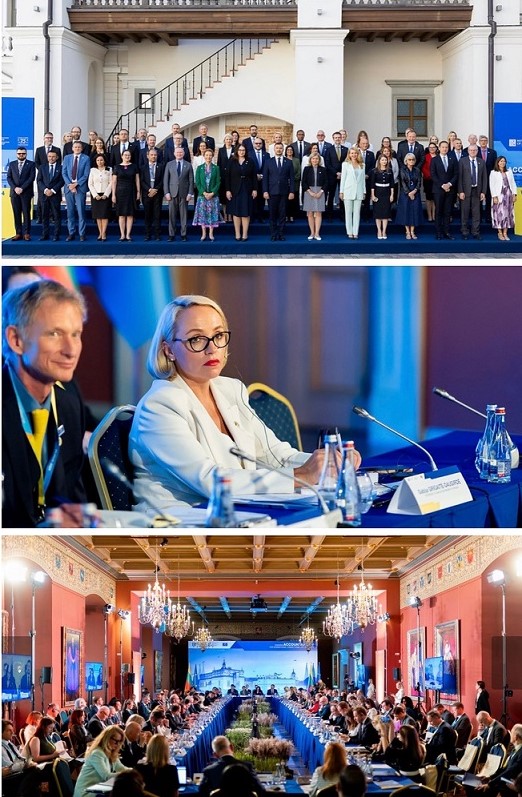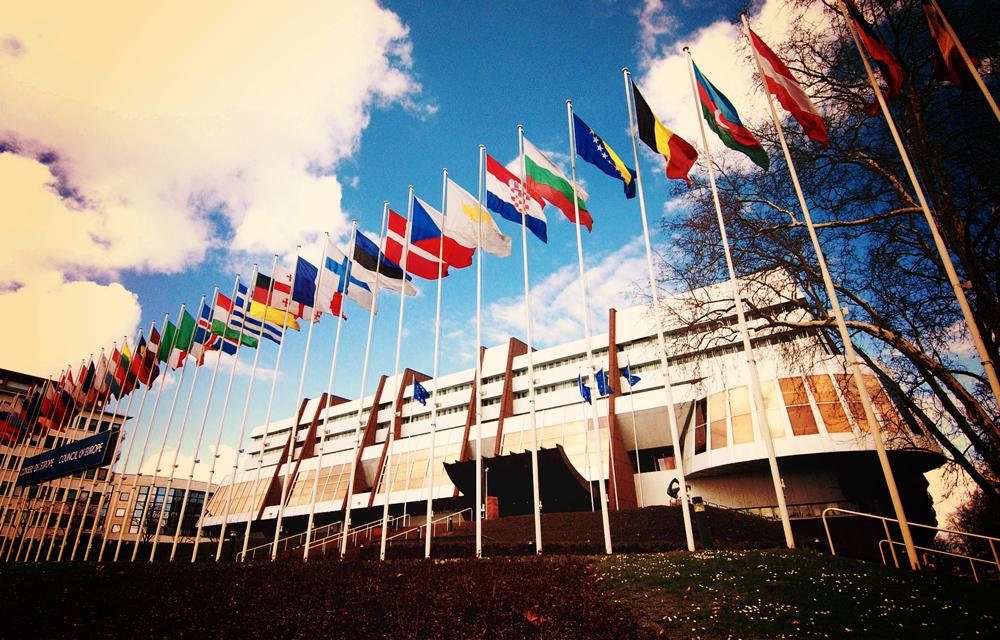CHECK AGAINST DELIVERY
Informal Conference of the Ministers of Justice
“Towards Accountability for International Crimes Committed in Ukraine”
5 September 2024
Session II: Special Tribunal for the Crime of Aggression against Ukraine and role of the Council of Europe
Jörg Polakiewicz
- Minister of Justice of Lithuania, Ministers, Excellencies,
- Thank you very much for the privilege to speak today on the important topic of the Special Tribunal for the Crime of Aggression for Ukraine.
- Let me start by echoing what the previous speaker, Nobel Peace Prize Winner Oleksandra Matviichuk said: if we want to stop wars, we must punish the leaders. In her powerful intervention, she referred to the promise of Nuremberg. In his opening statement before the International Military Tribunal, US chief prosecutor Robert Jackson emphasised “… the ultimate step in avoiding periodic wars, which are inevitable in a system of international lawlessness, is to make statesmen responsible to law.”
- And yet, today we found ourselves discussing the very situation which Jackson envisaged back in 1945: an act of aggression committed by one of the four states which itself sat in judgment of the Nazi regime.
- Despite significant progress made, the jurisdictional regime of the International Criminal Court as it currently stands – and the status of the Russian Federation as a permanent member of the UN Security Council – has left a jurisdictional and impunity gap for the crime of aggression.
- Creating an ad hoc special tribunal is the only way to fill the void and prosecute the crime which has enabled all others allegedly committed in Ukraine.
- I will quickly explain the background behind how the Council of Europe has found itself at the centre of these discussions, as well as some of the reasons why this choice indeed appears to represent a realistic option.
Background
- Shortly after the 2022 full scale invasion began, a group of states dedicated to achieving justice for Ukraine began discussing how to create a tribunal for the crime of aggression against Ukraine. This so-called ‘Core Group’ is now more than 40 states strong.
- The Core Group is composed of legal advisers from the relevant ministries of participating states as well as from the Council of Europe and EU legal services, some of the finest legal minds out there with whom I had the privilege to work over the last two years as the representative of the Council of Europe.
- Creating a special tribunal for a crime that has never been prosecuted since Nuremberg and Tokyo is no small task. Many difficult questions have been asked about how any such tribunal would look, the law it would apply, the application of immunities, and similarly complex legal questions which have strong political implications.
- I am happy to report to you that the Core Group has already made considerable progress with regard to these questions.
- Precedents show us that criminal tribunals can be created in different ways: by resolution of the UN Security Council, through a multilateral agreement; or through a bilateral agreement with the UN or another international organisation.
- I do not have to explain to you why any attempt to create a tribunal to try leaders of the Russian Federation would not pass through the UN Security Council. The alternative to pass through the UN General Assembly remains legally contested and politically hazardous.
- Creating the tribunal by multilateral agreement with (like the ICC) remains a viable option, although one which would involve a long negotiation process followed by cumbersome national ratifications. The question is also how many states would you need to make this treaty ‘international’ enough?
- Given all these concerns, the third option – creation through a bilateral agreement with Council of Europe has emerged as a realistic option. It would consist of a bilateral agreement with Ukraine setting up the Special Tribunal and containing its statute, complemented by an enlarged partial agreement to coordinate its financing and organisational matters of a non-judicial character. The resulting mechanism would be set up by an act of international law and yet firmly rooted in Ukrainian territorial jurisdiction.
- International criminal law has a rich history of examples of ad hoc or internationalised tribunals created through cooperation with international organisations. This was done for Cambodia, Sierra Leone, Lebanon, and the Extraordinary African Chambers, to name just a few.
- At a seminar held in Strasbourg in April this year, leading international experts confirmed that the creation of a special tribunal within the framework of the Council of Europe was legally feasible.
- Creating the Tribunal under the umbrella of the Council of Europe would anchor it within an existing institution. It could thus draw on the Council’s institutional infrastructure and know-how to support both the negotiation and operational phases of the tribunal – whether that be through legal frameworks, mutual assistance, the selection of judges and prosecutors, or the mobilisation and coordination of resources.
- The Council of Europe’s commitment to involving civil society adds a further dimension of legitimacy.
The need for legitimacy, international support, and cooperation
- Legitimacy in the eyes of the international community, defendants, and the victims of the crime will be key for the Tribunal’s success.
- In this context, I would like to recall the ICTY’s rebuttal of Slobodan Milosevic’s claim that it would be a “false” and even “illegal tribunal” targeting one country. Noting that the decisions of human rights bodies “establish that there is nothing inherently illegitimate in the creation of an ad hoc judicial body”, the ICTY stressed that the “important question is whether that body is established by law”, in the sense that, as it is stated in the Tadic Jurisdiction Appeal, it “should genuinely afford the accused the full guarantees of fair trial set out in Article 14 of the International Covenant on Civil and Political Rights.”
- The Council’s strong pedigree and experience promoting internationally recognised human rights standards is another avenue through which our Organisation can bring real experience and value to a Special Tribunal.
- If the foundations of the new tribunal are solid, it will be much easier to muster international support well beyond Europe. Examples such as the Cybercrime Convention, the Register of Damage and of course, the AI Convention which has just been opened for signature, demonstrate that the Council is capable of successfully associating states from other regions in its work.
- As ministers of justice, you are acutely aware how important international cooperation is. Cooperation with national authorities will be essential for the successful operation of the Tribunal, in particular for matters such as arrest, detention, extradition, and witness protection. Based on its experience with the European Convention on Mutual Assistance in Criminal Matters and the European Convention on Extradition, the Council of Europe can provide a forum for further discussion and development of model texts on these crucial issues.
Conclusion
- I started by evoking the legacy of Nuremberg. We cannot afford ignoring this legacy today. We must stand with Ukraine. By doing so, we do not only support our European neighbour fighting for its survival as a free and sovereign nation, but we also defend the very values and principles on which the Council of Europe was founded 75 years ago.
- As the Organisation’s legal adviser, I am convinced that the Council of Europe option has the potential to overcome the challenges and complex questions at hand.
- As legal adviser my role is to provide expert advice and to identify legally sound solutions. “Un bon conseiller doit trouver, s’il peut, une solution pour chaque difficulté et non pas une difficulté pour chaque solution.”
- Ultimately, it will be up to the Core Group to discuss the proposals put before it. I am confident that the Group will collectively come up with effective legal instruments, building on the significant acquis that the international community has collectively achieved in advancing international criminal justice.
- Complementarity with the ICC will be a key element of any solution.
- What is said about the wheels of justice, that they ‘turn slowly, but grind exceedingly fine’ applies also to multilateralism which is a complicated and often painfully slow process. And yet, it is the only realistic option for democratic states to come together and join their forces to defend an international legal order founded on the principle that might cannot make right.
- Let us seize the momentum created by the setting up of the International Centre for the Prosecution of the Crime of Aggression and the CoE Register of Damage.
- ‘Ukrainians need justice now, not in a distant future’, as Foreign Minister Dmytro Kuleba reminded us at the launching event of the Register on 2 April 2024 in The Hague.
- Impunity anywhere sends the wrong signal everywhere.
- Thank you for your attention.




